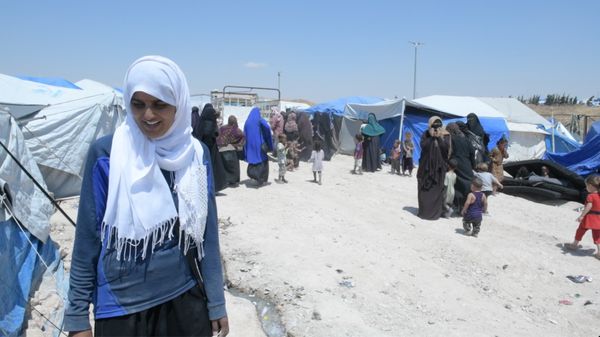Eye For Film >> Movies >> The Matchmaker (2022) Film Review
The Matchmaker
Reviewed by: Jennie Kermode

In the British tabloid press, she’s notorious: Tooba Gondal, who left her comfortable English home to marry a Daesh fighter in Syria and allegedly went on to recruit others, some of them just schoolchildren, to do likewise. There’s that odd disconnect found in a certain sort of journalism, whereby Samima Begum is said to be wholly responsible for the decision she made at 15 and yet Gondal is simultaneously accused of grooming her. Whichever way one reflects on this, Gondal is a fascinating subject for a documentary. Although this one never quite gets to the bottom of things – for reasons which are primarily circumstantial, and not the fault of director Benedetta Argentieri – it still incorporates some telling moments.
Argentieri met Gondal in a detention camp in northern Syria, where she spent several months following the collapse of Daesh and its unacknowledged state. Camps like this held – and in some cases still hold – vast numbers of women and children whom nobody knows what to do with, as the countries where they have citizenship refuse to take responsibility for them and no international tribunal has been established to determine guilt or innocence and sentence accordingly. At the start of the film, Argentieri speaks to a few of them, and it’s evident that there are any number of interesting stories there, not least the question of what should happen to the children, who need their mothers but risk radicalisation if they remain.
Gondal has a child – since placed in foster care – and it is this which seems to have prompted her to decry her past choices and seek some kind of redemption, or at least the appearance thereof. She’s difficult to gauge emotionally, presenting the calm, smiling face of an experienced propagandist. We see neither the blank emptiness which can follow trauma nor any sign of distress as she recounts the things which she has done and seen; instead she is keen to talk about how much she has changed, asserting that she’s now an entirely different person. The credibility of this is somewhat undermined by her repeated claims that she didn’t do what she’s accused of, withdrawn only upon being directly confronted with evidence that she did.
The evidence only goes so far. Gondal talks about the fact that some women were trained to use weapons, and in context her denial that she did so herself is pretty meaningless. In a more chilling scene, she talks about having met a man who had a 13-year-old Yazidi girl as his slave, but insists over and over again that the girl was in love with him – before denyiing that she had any knowledge of the way that Yazidi women and girls were abused, or any part in the trade which survivors – also interviewed here – insist was run largely by women.
Although it’s difficult to place much faith in what she says about herself, there are interesting insights here in terms of what she says about the experience of life within the Daesh state more generally, including her reflections on the way people reached it, the jobs women were allowed to do and the way marriage and divorce were organised. There is a vast reserve of cultural information here which, though it has been subject to some academic study, has barely been addressed in a public context. It is here that The Matchmaker, which screened in Venice before being selected for the From Venice To London festival, stands out. It also offers insights into post-conflict, post-atrocity psychology, comparable to some of the films made in Germany in the immediate aftermath of the Second World War.
The film ends rather abruptly following a mass escape from the camp, and Argentieri is unsuccessful in reestablishing communication with Gondal when she is subsequently imprisoned in France, awaiting trial. There is a sense that the film may have been a pleasant distraction from the grim life of the camp, or that participation constituted a last-ditch attempt by Gondal to control the narrative. if the latter is the case, it’s unlikely that anyone will fall for it.
Reviewed on: 01 Feb 2023















